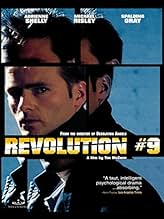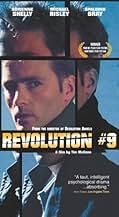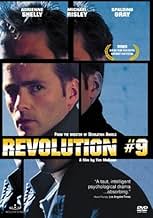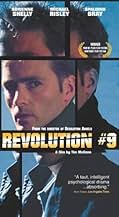Aggiungi una trama nella tua linguaA handsome and successful young man's life begins to unravel when he develops an acute sense of paranoia. Things escalate when Jackson is convinced that a tv ad holds sinister messages aimed... Leggi tuttoA handsome and successful young man's life begins to unravel when he develops an acute sense of paranoia. Things escalate when Jackson is convinced that a tv ad holds sinister messages aimed at him. Is Jackson losing his mind, or are the threats real?A handsome and successful young man's life begins to unravel when he develops an acute sense of paranoia. Things escalate when Jackson is convinced that a tv ad holds sinister messages aimed at him. Is Jackson losing his mind, or are the threats real?
- Regia
- Sceneggiatura
- Star
- Premi
- 2 vittorie e 1 candidatura in totale
James Burton
- Therapist Fuller
- (as Jim Burton)
Phyllis Somerville
- Judge Hathaway
- (as Phyllis Sommerville)
Recensioni in evidenza
Realistic portrayal of a man's descent into mental illness coupled with sharp media satire. Speaks volumes about our society's over saturation of commercialism and suggestive imagery. Amazing performances flesh out a dark, edgy story that definitely deserves recognition.
10B24
Surely this is what low-budget, independent filmmaking in terms of fulfilling its potential is all about. The unique qualities that differentiate film from other dramatic media like stage plays, audio-tapes, live television, etc. are evident in this film in great abundance. I was not at all put off by recurrent multiple visions, time-lapse episodes, color variations, and other visual effects that have annoyed one or two other viewers commenting here. What is truly amazing about the film is how it takes an ensemble of little-known actors and commonplace settings and creates something powerfully dramatic without losing the verité effect of a politically and socially relevant documentary.
As others have said about the subject matter (some seem very familiar with it in clinical terms), it grabs you by the throat and won't let go even after it comes to a rather abrupt end. I, too, have known people with similar mental illnesses, and have found myself in real life playing many of the roles pictured here -- though to varying degrees and with different outcomes. A sensitive viewer may even find himself or herself identifying strongly with one or another of the characters, which is always a measure of great acting and great storytelling. This film ought to be watched from beginning to end in a dark room with no one else present to offer comments, preferably late at night when one is left at the conclusion with no option except to relive the experiences for an hour or so in complete solitude.
This is a movie that comes with no laugh track. 10 of 10.
As others have said about the subject matter (some seem very familiar with it in clinical terms), it grabs you by the throat and won't let go even after it comes to a rather abrupt end. I, too, have known people with similar mental illnesses, and have found myself in real life playing many of the roles pictured here -- though to varying degrees and with different outcomes. A sensitive viewer may even find himself or herself identifying strongly with one or another of the characters, which is always a measure of great acting and great storytelling. This film ought to be watched from beginning to end in a dark room with no one else present to offer comments, preferably late at night when one is left at the conclusion with no option except to relive the experiences for an hour or so in complete solitude.
This is a movie that comes with no laugh track. 10 of 10.
10kathyg-2
For hollywood histrionics, see Opie's "A Beautiful Mind. For a low-key, searing and accurate portrait of a schizophrenic drowning in his delusions, see this little film. I saw it at the Telluride Film Festival, and it was one of the best films there. Refreshingly free of scenery chewing for it's own sake, the lead actor has a terrific natural intensity. And the director has the balls to deliver the gut wrenching feel bad ending that is the only one appropriate to this subject matter at this time.
10redlog
A taut, edgy psychological drama, brilliantly acted by newcomer Michael Risley and veteran Adrienne Shelly. I know of no other film that so honestly and nakedly depicts mental illness, that takes the viewer inside the excruciatingly painful experience of gradually losing one's grip on reality and forfeiting control of one's life. At the same time, the protagonist's notion that he is the target of a media conspiracy is depicted as merely an exaggerated and distorted version of the overwhelming media saturation and manipulation we all, each and every one of us, experience from day to day. "Take but degree away, untune that string, and hark what discord follows, " said Shakespeare's Ulysses in his play Troilus and Cressida. In this film we sense just how tenuous that string by which we hold onto our sanity, and to everything that matters to us in life, can be.
While the film takes us subjectively, with unnerving close-ups, odd angles, abrupt shifts of focus, into the disorienting experience of its protagonist, it at the same time creates an eerie sense of not only a character increasingly alienated from his world, but of a world of people, objects, even a cityscape themselves sensed as increasingly alien. In holding focus on an object or an image for just a second too long (that is, longer than would be needed to establish that it is the character's bizarre fixation), the unnerving gaze and the sense of the familiar turned suddenly unfamilar feels as if it is our own. In other words, the ordinary world starts to look like something we have never seen or noticed before.
All of this is accomplished by the director with the strength of honest story telling that is the tradmark of his work (Desolation Angels). As stylized and artistically accomplished as the film is, one never senses that it is trying to be self-consciously arty or manipulative for its own sake. It is the story told from the point of view of a man increasingly out of joint in a world itself falling out of joint. So truth, from this perspective, requires that the camera itself be "on tilt."
About the performances one can only admire the intensity and focus brought by Michael Risley to his portrayal of a man going out of focus. We are with him every step of the way, and---and this is I think the trick---our sympathy for him only increases the more off-putting and bizarre his behavior gets. Someone once said you have to be a pretty good skater to play a drunk on skates. Risely navigates this thin ice brilliantly. Adrienne Shelly is also utterly captivating in a very difficult part: the girlfriend who, though utterly powerless to help him, nevertheless tries---not only because she perhaps loves him, but because it is clear that no one else in the world cares or is even concerned. Without ever seeming to give up hope, she senses the situation's desperation, and what is finally at stake. And so, while played as someone vulnerable, even wounded, and tender, she nonetheless brings something of real human strength, even quiet heroism, to the part through her decency and forbearance.
Finally, the film is also, on another level, an indictment of the mental health system and about the cloud that still surrounds mental illness in this country. Legally, there is no way to hold Jackson (Risley's character). And he is too ill to commit himself. And even then, who would pay? Not the insurance companies to be sure. And families for the most part are either financially, emotionally, or socially ill-equipped to cope with the mentally ill. While the film takes the viewer, together with its lead actor, deeper and deeper into the vortex of madness, it nevertheless offers a sobering view of a troubling and grotesque social reality and of affliction that, on more than one level, hits close, too close, to home.
While the film takes us subjectively, with unnerving close-ups, odd angles, abrupt shifts of focus, into the disorienting experience of its protagonist, it at the same time creates an eerie sense of not only a character increasingly alienated from his world, but of a world of people, objects, even a cityscape themselves sensed as increasingly alien. In holding focus on an object or an image for just a second too long (that is, longer than would be needed to establish that it is the character's bizarre fixation), the unnerving gaze and the sense of the familiar turned suddenly unfamilar feels as if it is our own. In other words, the ordinary world starts to look like something we have never seen or noticed before.
All of this is accomplished by the director with the strength of honest story telling that is the tradmark of his work (Desolation Angels). As stylized and artistically accomplished as the film is, one never senses that it is trying to be self-consciously arty or manipulative for its own sake. It is the story told from the point of view of a man increasingly out of joint in a world itself falling out of joint. So truth, from this perspective, requires that the camera itself be "on tilt."
About the performances one can only admire the intensity and focus brought by Michael Risley to his portrayal of a man going out of focus. We are with him every step of the way, and---and this is I think the trick---our sympathy for him only increases the more off-putting and bizarre his behavior gets. Someone once said you have to be a pretty good skater to play a drunk on skates. Risely navigates this thin ice brilliantly. Adrienne Shelly is also utterly captivating in a very difficult part: the girlfriend who, though utterly powerless to help him, nevertheless tries---not only because she perhaps loves him, but because it is clear that no one else in the world cares or is even concerned. Without ever seeming to give up hope, she senses the situation's desperation, and what is finally at stake. And so, while played as someone vulnerable, even wounded, and tender, she nonetheless brings something of real human strength, even quiet heroism, to the part through her decency and forbearance.
Finally, the film is also, on another level, an indictment of the mental health system and about the cloud that still surrounds mental illness in this country. Legally, there is no way to hold Jackson (Risley's character). And he is too ill to commit himself. And even then, who would pay? Not the insurance companies to be sure. And families for the most part are either financially, emotionally, or socially ill-equipped to cope with the mentally ill. While the film takes the viewer, together with its lead actor, deeper and deeper into the vortex of madness, it nevertheless offers a sobering view of a troubling and grotesque social reality and of affliction that, on more than one level, hits close, too close, to home.
There have been a multitude of movies that have looked at mental illness, from inside and out, but I don't know of any that has romanticized schizophrenia less than this one.
No colorful Blanche Dubois here, with her tag lines like, "I've always depended on the kindness of strangers." No stunningly gorgeous Catherine Deneuve disintegrating along with the rabbit carcasses in her apartment. No appealingly misunderstood Janet Margolin and Kear Dullea who find a way out of the maze through love. No sensational expose of the mental health system as in "The Snake Pit" and "One Flew Over the Cuckoo's Nest." Michael Risely is not a tormented genius either, nor does he win a Nobel Prize or leave a legacy of art masterpieces, music, or writing behind. And the love and support of his girl friend, Adrienne Shelley, doesn't save him -- as it wouldn't in real life.
Risley and Shelley are two ordinary people who find their lives struck by lightning. About one percent of the population will go through an episode of schizophrenia, and the ripples spread out from them, encompassing friends and family.
Risley has an ordinary personality and looks rather ordinary, as does his fiancee. He brings her a kitten in a bag full of food and tells her not to get too attached to it because he wants to get it in the pot as soon as possible. His humor is deadpan. And this flattish quality makes it more difficult for everyone, including himself, to recognize the first appearance of paranoid delusions. At first, they're minor. Somebody seems to have rearranged the items on his desk and he warns his puzzled coworkers not to do it again because it's "adolescent." Like the rest of us "normal" folk, he has a job, although it doesn't pay very well. The delusions begin to interfere with his performance at work and he loses his job. In the course of lending him support, his fiancee loses her job as well. This is how it generally works. When you are gravely disabled, you alienate your friends and family and you lose your paycheck. Now you've got money problems on top of everything else. And one of the worst places you can do this is New York City where such secondary institutions as psychiatric services are geared to provide minimally effective, impersonal custodianship under depressingly shabby conditions.
The details of Risley's descent into madness ring depressingly true. Hospitalized, he lies in his bed at night listening to a phone ringing insistently somewhere. And the director provides us with still shots of empty corridors, institutional sinks, and vacant chair seats. Nobody's home. When he tries to walk down the darkened hallway at night, for reasons unclear even to him, he is stopped by a burly black guy (aides and orderlies are disproportionately people of color) who tells him politely but very firmly to get back to his bed.
It's a first-rate script, if you're looking for naturalism. There are weaknesses in the direction -- so many shaky shots with a hand-held camera. Images that fill the screen are too often glaring closeups, making the viewer even less comfortable than he/she needs to be. The story is strong enough as it is. Sometimes when a character is speaking we see only part of his face, a jaw with a telephone receiver in front of it, or half a head, as in a commercial for a brokerage firm. There is little in the way of music, which is okay. The amplified sound track turns the drip of a faucet into a sound filled with foreboding. The lesser roles are well written too. As is usual when someone is spotted standing on the ledge of a tall building, there are people watching from the street yelling at him to go ahead and jump. None of the principal actors deliver performances that call attention to themselves. The level of competence seems to be about the same as in a made-for-TV movie. But the narrative is so strong it carries the picture along. And actually the movie, being realistic, is pretty depressing. Nobody knows what causes schizophrenia. There is clearly some genetic loading, as twin and adoption studies have demonstrated, but there's much more to it than that, because most often if one identical twin "has it," the other does not. Some prenatal or environmental trigger? No one has identified it yet. To make matters as bad as possible, schizophrenics are so wrapped up in their own illnesses that they form no bonds with their fellow sufferers. They don't have the kind of mutual support that most minority groups, like African-Americans or women, can depend on. They're socially bankrupt. A true tragedy.
No colorful Blanche Dubois here, with her tag lines like, "I've always depended on the kindness of strangers." No stunningly gorgeous Catherine Deneuve disintegrating along with the rabbit carcasses in her apartment. No appealingly misunderstood Janet Margolin and Kear Dullea who find a way out of the maze through love. No sensational expose of the mental health system as in "The Snake Pit" and "One Flew Over the Cuckoo's Nest." Michael Risely is not a tormented genius either, nor does he win a Nobel Prize or leave a legacy of art masterpieces, music, or writing behind. And the love and support of his girl friend, Adrienne Shelley, doesn't save him -- as it wouldn't in real life.
Risley and Shelley are two ordinary people who find their lives struck by lightning. About one percent of the population will go through an episode of schizophrenia, and the ripples spread out from them, encompassing friends and family.
Risley has an ordinary personality and looks rather ordinary, as does his fiancee. He brings her a kitten in a bag full of food and tells her not to get too attached to it because he wants to get it in the pot as soon as possible. His humor is deadpan. And this flattish quality makes it more difficult for everyone, including himself, to recognize the first appearance of paranoid delusions. At first, they're minor. Somebody seems to have rearranged the items on his desk and he warns his puzzled coworkers not to do it again because it's "adolescent." Like the rest of us "normal" folk, he has a job, although it doesn't pay very well. The delusions begin to interfere with his performance at work and he loses his job. In the course of lending him support, his fiancee loses her job as well. This is how it generally works. When you are gravely disabled, you alienate your friends and family and you lose your paycheck. Now you've got money problems on top of everything else. And one of the worst places you can do this is New York City where such secondary institutions as psychiatric services are geared to provide minimally effective, impersonal custodianship under depressingly shabby conditions.
The details of Risley's descent into madness ring depressingly true. Hospitalized, he lies in his bed at night listening to a phone ringing insistently somewhere. And the director provides us with still shots of empty corridors, institutional sinks, and vacant chair seats. Nobody's home. When he tries to walk down the darkened hallway at night, for reasons unclear even to him, he is stopped by a burly black guy (aides and orderlies are disproportionately people of color) who tells him politely but very firmly to get back to his bed.
It's a first-rate script, if you're looking for naturalism. There are weaknesses in the direction -- so many shaky shots with a hand-held camera. Images that fill the screen are too often glaring closeups, making the viewer even less comfortable than he/she needs to be. The story is strong enough as it is. Sometimes when a character is speaking we see only part of his face, a jaw with a telephone receiver in front of it, or half a head, as in a commercial for a brokerage firm. There is little in the way of music, which is okay. The amplified sound track turns the drip of a faucet into a sound filled with foreboding. The lesser roles are well written too. As is usual when someone is spotted standing on the ledge of a tall building, there are people watching from the street yelling at him to go ahead and jump. None of the principal actors deliver performances that call attention to themselves. The level of competence seems to be about the same as in a made-for-TV movie. But the narrative is so strong it carries the picture along. And actually the movie, being realistic, is pretty depressing. Nobody knows what causes schizophrenia. There is clearly some genetic loading, as twin and adoption studies have demonstrated, but there's much more to it than that, because most often if one identical twin "has it," the other does not. Some prenatal or environmental trigger? No one has identified it yet. To make matters as bad as possible, schizophrenics are so wrapped up in their own illnesses that they form no bonds with their fellow sufferers. They don't have the kind of mutual support that most minority groups, like African-Americans or women, can depend on. They're socially bankrupt. A true tragedy.
Lo sapevi?
- Curiosità sui creditiNo maggots were harmed during the making of this film.
- ConnessioniReferences L'eclisse (1962)
I più visti
Accedi per valutare e creare un elenco di titoli salvati per ottenere consigli personalizzati
Dettagli
Botteghino
- Budget
- 300.000 USD (previsto)
- Lordo Stati Uniti e Canada
- 10.133 USD
- Fine settimana di apertura Stati Uniti e Canada
- 4936 USD
- 17 nov 2002
- Lordo in tutto il mondo
- 10.133 USD
Contribuisci a questa pagina
Suggerisci una modifica o aggiungi i contenuti mancanti
































